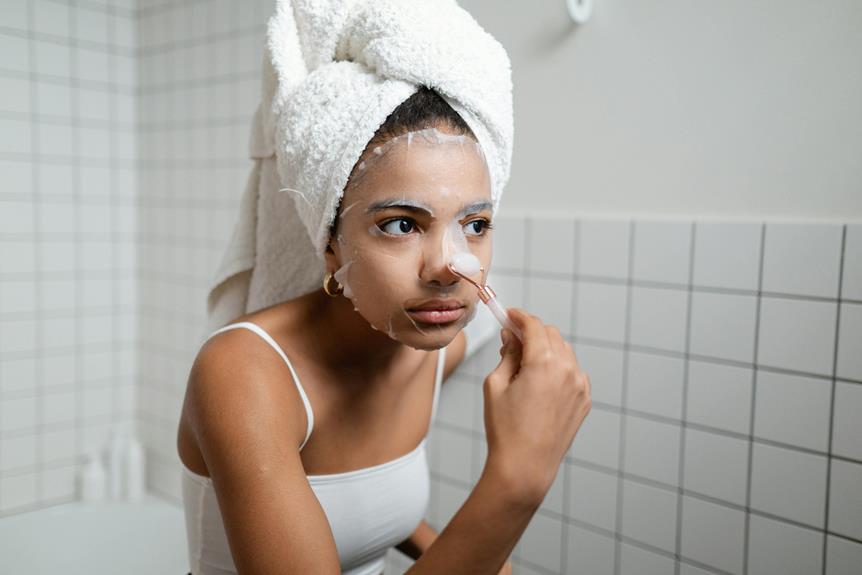
For optimal skin health, understand your skin type and factors like lifestyle and environment to determine the best bathing frequency. Oily skin benefits from more frequent bathing, while dry skin may need less. Consider hot, humid climates that may require more showers, or dry climates leading to skin dryness. Recommended bathing once a day or every other day, adjust based on your skin's needs. Consult a dermatologist for personalized advice on maintaining healthy skin.
Understanding Your Skin Type
To determine how often you should bathe for healthy skin, it's essential to first understand your skin type. Different skin types have varying needs when it comes to cleansing and maintaining optimal health. If you have oily skin, you may benefit from more frequent bathing to help control oil production and prevent breakouts. Dry skin, on the other hand, may require less frequent bathing to avoid stripping away essential oils that keep your skin hydrated.
For those with sensitive skin, bathing too often can lead to irritation and redness. It's crucial to find a balance that keeps your skin clean without causing inflammation. Combination skin may require a tailored approach, focusing on different areas of the body based on their individual needs. Understanding your skin type is the first step in developing a bathing routine that promotes healthy skin without causing harm. By recognizing what your skin needs, you can create a bathing schedule that works best for you.
Factors Influencing Bathing Frequency
Considering your lifestyle, environment, and physical activity levels can help determine how often you should bathe for healthy skin. If you live in a hot and humid climate or engage in activities that make you sweat frequently, you may need to bathe more often to prevent clogged pores and body odor. On the other hand, if you have dry skin or live in a colder, drier climate, bathing too frequently can strip your skin of its natural oils, leading to dryness and irritation.
Additionally, if you have skin conditions such as eczema or psoriasis, your bathing frequency may need to be adjusted to prevent flare-ups. People who work in environments with high levels of dirt or chemicals may also need to bathe more frequently to remove these substances from their skin.
Ultimately, finding the right balance for your bathing frequency is crucial for maintaining healthy skin. By considering these factors and observing how your skin responds to different bathing routines, you can establish a bathing frequency that promotes optimal skin health.
Recommended Bathing Frequency
For optimal skin health, determining the recommended bathing frequency is essential based on your individual factors and skin type. Bathing too frequently or infrequently can both have negative effects on your skin. Generally, for most people with normal skin, bathing once a day or every other day is sufficient to maintain cleanliness without stripping the skin of its natural oils.
However, if you have dry skin, you may benefit from less frequent bathing to prevent further dryness and irritation. On the other hand, if you have oily skin or engage in activities that make you sweat heavily, you may need to bathe more frequently to prevent clogged pores and breakouts.
It's important to pay attention to how your skin reacts to your bathing routine. If you notice excessive dryness, redness, or irritation, you may need to adjust your bathing frequency accordingly. Consulting with a dermatologist can also help you determine the best bathing frequency for your skin type and individual needs.
Tips for Healthy Skin Maintenance
Maintain healthy skin by incorporating a consistent skincare routine tailored to your skin type and needs. Start by cleansing your face twice a day with a gentle cleanser to remove dirt, oil, and impurities. Follow up with a moisturizer to keep your skin hydrated and protected. Don't forget to apply sunscreen every morning to shield your skin from harmful UV rays. Exfoliate weekly to remove dead skin cells and reveal a fresh, glowing complexion.
In addition to your daily skincare routine, make sure to stay hydrated by drinking plenty of water throughout the day. A well-balanced diet rich in fruits, vegetables, and lean proteins can also contribute to healthy skin. Get an adequate amount of sleep each night to allow your skin time to repair and regenerate.
Avoid touching your face frequently and remember to wash your pillowcases regularly to prevent the buildup of bacteria. If you have specific skin concerns, consider consulting a dermatologist for personalized advice. By following these tips and maintaining a consistent skincare routine, you can promote healthy, radiant skin.
Adjusting Your Bathing Routine
To enhance your overall skin health, adjusting your bathing routine can play a significant role in maintaining a balanced skincare regimen. When it comes to bathing, consider shortening your time in the shower and using warm rather than hot water. Hot water can strip your skin of its natural oils, leading to dryness and irritation. Opt for gentle, fragrance-free cleansers to avoid potential skin reactions or allergies. Additionally, try to limit the use of harsh exfoliants to prevent damaging the skin's protective barrier.
After bathing, pat your skin dry instead of rubbing vigorously to help retain moisture. It's also beneficial to apply a moisturizer while your skin is still slightly damp to lock in hydration. If you have specific skin concerns, such as eczema or acne, consult with a dermatologist to determine the best bathing routine for your needs.




